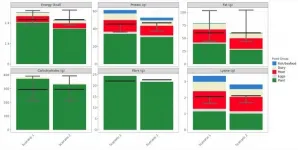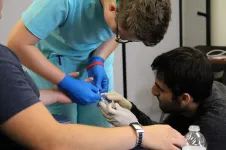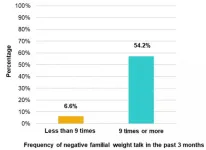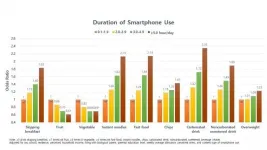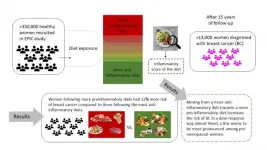Prenatal supplements might influence bacterial composition of breast milk Breast milk contains a unique mix of bacteria - known as its microbiota - that plays an important role in child health. In a new study, researchers from Purdue University examined whether diet or supplements taken prenatally affected the microbiota of breast milk in 771 mothers participating in the CHILD Cohort Study. The analysis revealed that supplements, but not dietary patterns, were linked with changes in human milk microbiota composition. Mothers who took fish oil or folate supplements during pregnancy had a lower microbial diversity than those who did not while mothers who took vitamin C had higher diversity than those who did not. The researchers say that more analysis is needed to account for other variables that might influence the human milk microbiome.
Rana Chehab will present this research in an on-demand session during NUTRITION 2021 LIVE ONLINE from noon on Monday, June 7 through 5:30 p.m. on Friday, June 10 (abstract; presentation details). Image available.
New insights into how maternal obesity might affect children Although maternal obesity is known to influence the health of offspring, scientists are still working to understand why the effects are not always consistent. Researchers at Pennington Biomedical Research Center studied 22 mothers with obesity with or without other risk factors for metabolic syndrome including high blood sugar or high cholesterol. They found that the women with the additional risk factors tended to have higher glucose levels compared to the women without the risk factors, despite similar levels of weight gain and total fat mass gain during pregnancy. Offspring born to mothers with the additional risk factors weighed more and had more fat mass than offspring born to mothers without the additional risk factors. These results suggest that metabolically unhealthy obesity results in a longer exposure to higher levels of glucose and triglycerides, promoting increased fat mass and weight for the offspring at birth. The findings also identify women with obesity and other risk factors as a group who could benefit from prenatal interventions.
Emily W. Flanagan will present this research in an on-demand session during NUTRITION 2021 LIVE ONLINE from noon on Monday, June 7 through 5:30 p.m. on Friday, June 10 (abstract; presentation details).
Physical activity during pregnancy linked with epigenetic changes Studies have shown that maternal physical activity could influence the health of offspring through epigenetic modifications in the placenta, but whether the timing of this activity was important remains unclear. Epigenetic modifications, such as methylation, alter levels of gene expression without changing the genetic code. New research from the Eunice Kennedy Shriver National Institute of Child Health and Human Development (NICHD) found that physical activity during pregnancy was linked with methylation of genes potentially related to multiple pathways, such as carbohydrate metabolism, cellular function, cardiovascular and neurological system development. The study, which included 296 mothers in the NICHD Fetal Growth Studies-Singleton cohort, did not find a significant association with physical activity before pregnancy and methylation. If replicated, the new findings could shed light onto the mechanisms underlying changes into how maternal physical activity influences epigenetic changes.
Sifang Kathy Zhao will present this research in an on-demand session during NUTRITION 2021 LIVE ONLINE from noon on Monday, June 7 through 5:30 p.m. on Friday, June 10 (abstract; presentation details).
When you eat could affect how well you sleep while pregnant There is a well-known relationship between when we eat and body's circadian rhythm. New research from UCSI University in Malaysia is looking at how this relationship -- known as chrononutrition -- relates to sleep quality and melatonin rhythm during pregnancy. The hormone melatonin helps control our sleep-wake cycle. For the study, the researchers examined meal timing, meal frequency, eating window, breakfast skipping and night eating for 114 women who were pregnant for the first time. They found that women who ate less frequently or who consumed lower amounts of fat during dinner compared to breakfast and lunch were more likely to have poor sleep quality. Eating closer to bedtime was associated with peak melatonin levels that occurred outside of the usual mid-sleep peak. The findings suggest that unfavorable characteristics of chrononutrition may alter circadian melatonin rhythm during pregnancy and contribute to poor sleep.
Ai Ni Teoh will present this research in an on-demand session during NUTRITION 2021 LIVE ONLINE from noon on Monday, June 7 through 5:30 p.m. on Friday, June 10 (abstract; presentation details). Description includes information that was updated after the original abstract was submitted. Image available.
INFORMATION:
NUTRITION 2021 LIVE ONLINE is the flagship online meeting of the American Society for Nutrition to be held online June 7-10, 2021. Watch on-demand sessions, view posters and more by registering for a free pass to attend the virtual meeting.
Please note that abstracts presented at NUTRITION 2021 LIVE ONLINE were evaluated and selected by a committee of experts but have not generally undergone the same peer review process required for publication in a scientific journal. As such, the findings presented should be considered preliminary until a peer-reviewed publication is available.
About NUTRITION 2021 LIVE ONLINE
NUTRITION 2021 LIVE ONLINE, held June 7-10, 2021 is a dynamic virtual event showcasing new research findings and timely discussions on food and nutrition. Scientific symposia explore hot topics including clinical and translational nutrition, food science and systems, global and public health, population science and cellular and physiological nutrition and metabolism. https://meeting.nutrition.org #NutritionLiveOnline
About the American Society for Nutrition (ASN)
ASN is the preeminent professional organization for nutrition research scientists and clinicians around the world. Founded in 1928, the society brings together the top nutrition researchers, medical practitioners, policy makers and industry leaders to advance our knowledge and application of nutrition. ASN publishes four peer-reviewed journals and provides education and professional development opportunities to advance nutrition research, practice and education. http://www.nutrition.org
Find more news briefs and tipsheets at: https://www.eurekalert.org/meetings/nutrition/2021/newsroom


